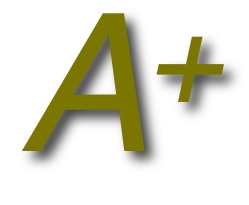 I had the dubious honor of starting college during the first crackdown on grade inflation. My professors overtly ensured that every grade on our transcripts was hard-earned. Then I immediately started teaching college, where I was required to submit charts comparing my grades to the traditional bell curve, along with an explanation for any divergence. I did award more As or Bs than a bell curve would predict, and it wasn’t hard to explain. I was good at teaching people to write, so when essays were scored against rubrics instead of against other people’s essays, the curve skewed higher as the semester progressed, as I believe it should.
I had the dubious honor of starting college during the first crackdown on grade inflation. My professors overtly ensured that every grade on our transcripts was hard-earned. Then I immediately started teaching college, where I was required to submit charts comparing my grades to the traditional bell curve, along with an explanation for any divergence. I did award more As or Bs than a bell curve would predict, and it wasn’t hard to explain. I was good at teaching people to write, so when essays were scored against rubrics instead of against other people’s essays, the curve skewed higher as the semester progressed, as I believe it should.
These days, rumors have it that 40% of students get As, and the debate about grade inflation flares again. Rumor has it that this time, we instructors are too wimpy to be honest with these consumer-students whose evaluations now determine whether we work or not.
But that isn’t my experience. What’s happening in my world is that the most common grade is the W. When students realize they aren’t getting that A–and this is especially easy with my institution’s generous midpoint withdrawal point–they drop.
Some students don’t do the work, realize where they are headed, then drop. Many take heavy loads, then drop the lowest grade. Many have illnesses, or car accidents, or family crises; while some emergency withdrawals seem necessary, in other cases, it’s clear that these students could complete the class (with an A even), but they fear what might happen–not that they won’t pass the class, but that they won’t get an A.
It’s midpoint for my students, so every day brings e-mails like these two, this morning’s samples:
“Sadly, I wish to be withdrawn from your class. I am taking a ton of classes right now and I can’t keep up with all the work this course requires and still get an A at the moment. The [college] office told me to send you an email asking for a withdrawal from the class. Thanks for everything!”
“Looks like I am going to have to withdrawal. It sucks but I cant take a chance that i will not get an ‘A’ in this class. I have talked to my lawyer and the responsible party with pay for this class, and I will re-sign up. I will attempt to try and get you as an instructor again. Thank you for all your help and constructive criticism.”
Even a non-A for a single assignment can trigger a drop. And the work required to focus a research question according to the course’s instructions, based on actual research, is too much for many students.
I have students announce early that they must have an A in my class. Students actually earning As don’t say that; they do the work and earn the grades. But the ones who get behind and/or don’t follow instructions announce that their As are non-negotiable, as though I have power to grant the prize despite any lack of effort or achievement.
When my own 7th grader got a C on his progress report (the result of missing assignments rather than aptitude) he declared that this didn’t matter because “C is average.” Them’s fighting words around here. I explained grade inflation and reminded him that even if Cs were still average, rocket scientists don’t have a reputation for being average students. (We used to say, “It isn’t brain surgery,” and now we say, “It isn’t rocket science.”) If Cs become the norm, his grades and his dreams won’t be accurately aligned for a successful Mars landing, or anything else he’s passionate about.
Today’s world requires collaboration and cooperation more than competition. Nothing would please me more than to have all my students earning As, because they worked that hard, and because I supported their learning that effectively. But human nature being operational, that is not happening.
It only appears to be happening, because for most students, it’s an A or nothing. Most students would rather pay for the class two or three times than get a B. This has me feeling increased respect for students who do stick it out for a B or a C. Those grades are often hard-won by students who are more gifted in other fields. I hope that in the future, along with students’ GPAs, we will report their course completion rates. Employers would do well to value the latter as more indicative of planning skills, tenacity, and raw courage.
Do you agree? What are you experiencing?
_______________________
Text © Gwyn Nichols 2012. All rights reserved. WritersResort.com
Image created by author in Mac Pages, Helvetica oblique.

7th Grade!!! Why he’s just a baby! That can’t possibly be. 🙂
On the other side of this information in this blog is my granddaughter (h.s. sophomore) who has a teacher who’s ego dictates hardly anyone will get an A in his class. He makes sure that is so. After 3 hours a night doing homework just for his class, Hannah is pulling a D into C. She is by no means an academic slouch. What does this do for the joy of learning? Not much in my book.
Good to hear from you. I see older son is in NY – for ever or just a short while? Smiles and hugs…c
LikeLike
I’ll say, she’s no slouch.
I had a teacher like that. Accelerated chemistry. And I was a sophomore, too.
Of 21 students, we had seven girls and seven sophomores, and I was both. I was so intimidated by my classmates’ brilliance, it never occurred to me to that a roomful of smart junior and senior guys might have been the answer, instead of the complication to my problem. Some of them were even cute. Why didn’t I ask for help???
Ironically enough, the strain earned me only a B in my teacher’s book, but the final was a standardized exam where I scored so well, an association of women chemical engineers offered me a full-ride four-year scholarship for the university of my choice if I would major in chemistry or chemical engineering. I wonder if I would have seriously considered that offer if I had enjoyed the learning and felt encouraged rather than bludgeoned by my teacher, his ineffective lecture methods, and his demeaning responses to our mistakes.
When that guy finished his doctorate, we were all thrilled, thinking it meant he would go teach at the mega-university three miles away. No such luck. I think he tortured another generation.
Some subjects are challenging, and might even consume many hours a night, but I think the goal should be attainable, and learning anything can be fun.
If it’s any consolation for Hannah, it’s experiences like this which taught me that I can do hard things, I can request help to match my learning styles, and I can approach teaching in a more effective way.
(As for my sons, First One has another year at ASU before he’s off to seek his fortune. Little Bro wants him to put his life on hold until they can leave together. I doubt that will happen.)
LikeLike